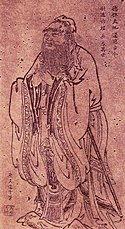Confucius Quote
For this reason the gentleman will employ a man on a distant mission and observe his degree of loyalty, will employ him close at hand and observe his degree of respect. He will hand him troublesome affairs and observe how well he manages them, will suddenly ask his advice and observe how wisely he answers. He will exact some difficult promise from him and see how well he keeps it, turn over funds to him and see with what benevolence he dispenses them, inform him of the danger he is in and note how faithful he is to his duties. He will get him drunk with wine and observe how well he handles himself, place him in mixed company and see what effect beauty has upon him. By applying these nine tests, you may determine who is the unworthy man.
For this reason the gentleman will employ a man on a distant mission and observe his degree of loyalty, will employ him close at hand and observe his degree of respect. He will hand him troublesome affairs and observe how well he manages them, will suddenly ask his advice and observe how wisely he answers. He will exact some difficult promise from him and see how well he keeps it, turn over funds to him and see with what benevolence he dispenses them, inform him of the danger he is in and note how faithful he is to his duties. He will get him drunk with wine and observe how well he handles himself, place him in mixed company and see what effect beauty has upon him. By applying these nine tests, you may determine who is the unworthy man.
Related Quotes
About Confucius
Confucius considered himself a transmitter for the values of earlier periods which he claimed had been abandoned in his time. He advocated for filial piety, endorsing strong family loyalty, ancestor veneration, the respect of elders by their children and of husbands by their wives. Confucius recommended a robust family unit as the cornerstone for an ideal government. He championed the Silver Rule, or a negative form of the Golden Rule, advising, "Do not do unto others what you do not want done to yourself."
The time of Confucius's life saw a rich diversity of thought, and was a formative period in China's intellectual history. His ideas gained in prominence during the Warring States period, but experienced setback immediately following the Qin conquest. Under Emperor Wu of Han, Confucius's ideas received official sanction, with affiliated works becoming mandatory readings for career paths leading to officialdom. During the Tang and Song dynasties, Confucianism developed into a system known in the West as Neo-Confucianism, and later as New Confucianism. From ancient dynasties to the modern era, Confucianism has integrated into the Chinese social fabric and way of life.
Traditionally, Confucius is credited with having authored or edited many of the ancient texts including all of the Five Classics. However, modern scholars exercise caution in attributing specific assertions to Confucius himself, for at least some of the texts and philosophy associated with him were of a more ancient origin. Aphorisms concerning his teachings were compiled in the Analects, but not until many years after his death.
